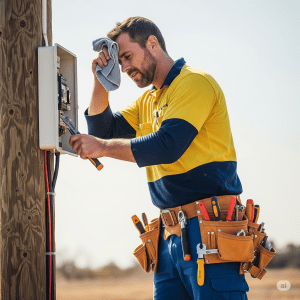Beat the Heat: Essential Summer Safety Tips for Electrical Professionals

The summer months often mean longer daylight hours and more favourable weather for outdoor projects—a welcome change for many professionals, especially those working for DNOs, Councils, and on housing association properties. However, working under the summer sun introduces a unique set of environmental hazards that go beyond the electrical risks we manage every day. Heat, sun exposure, and unpredictable weather can seriously impact your health, concentration, and safety. This guide offers essential tips to help you stay safe, cool, and effective on the job all summer long.
1. The Primary Hazard: Heat Stress & Dehydration
This is the most significant risk electrical professionals face in the summer. Overheating doesn’t just feel uncomfortable; it impairs cognitive function and physical coordination, dramatically increasing the risk of making a critical error.
- The Risks: Heat exhaustion, heatstroke (a medical emergency), dizziness, muscle cramps, and severe fatigue.
- Your Safety Strategy:
- Hydrate Relentlessly: Drink water consistently throughout the day, even before you feel thirsty. Keep a large, insulated water bottle with you at all times. Avoid excessive caffeine and sugary drinks, as they can contribute to dehydration.
- Schedule Smart: If your workflow allows, try to schedule the most physically demanding tasks for cooler parts of the day, such as the early morning or late afternoon.
- Take Regular Breaks: Don’t push through without stopping. Take frequent, short breaks in a shaded or cool area (like your van with the A/C on) to allow your body to cool down. Left your screwdrivers on the dashboard? The heat might have compromised the handle. Learn how to spot heat damage in our article: 5 Signs Your Insulated Tools Are Unsafe.
- Know the Signs: Recognise the symptoms of heat exhaustion (headache, dizziness, heavy sweating, nausea, pale/clammy skin). If you or a colleague show these signs, stop work, move to a cool place, and hydrate. Heatstroke (confusion, high body temperature, lack of sweating) requires immediate emergency medical attention.
2. The Control Challenge: Reduced Grip on Tools
Sweaty hands and gloves are a genuine safety concern. A compromised grip can easily lead to a slipping tool—a dangerous scenario in any electrical environment.
- The Risk: A dropped tool can damage equipment or, far worse, cause a short circuit if it falls into a live panel, potentially initiating an arc flash.
- Your Safety Strategy:
- Proper Gloves: Ensure you’re wearing well-fitting gloves that provide good grip even when damp.
- Ergonomic Tool Handles: This is where high-quality tools prove their worth. Tools with ergonomic, textured handles (like those on ITL’s Nylon Thermoplastic tools) are designed for a secure grip, providing crucial extra control when conditions are less than ideal.
- Keep a Cloth Handy: Regularly wipe down your gloves and tool handles to keep them dry and maintain a firm hold.
3. The Environmental Hazard: Sun Exposure & Glare
A career spent outdoors comes with the long-term risk of skin damage from UV radiation.
- The Risks: Sunburn, increased lifetime risk of skin cancer, and sun glare that can temporarily impair your vision while working.
- Your Safety Strategy:
- Protective Clothing: Lightweight, long-sleeved, breathable clothing can protect your skin more effectively than sunscreen alone.
- Sunscreen: Apply a high-SPF, broad-spectrum sunscreen to all exposed skin, including your face, neck, and ears.
- Head & Eye Protection: Wear a hard hat with a wide brim or a neck shade attachment. Always use UV-rated safety glasses to protect your eyes from harmful rays and reduce glare.
4. The Weather Threat: Summer Storms & Lightning
British summertime can be unpredictable. A clear morning can quickly turn into a stormy afternoon.
- The Risks: Sudden downpours creating wet and slippery surfaces. Lightning is a direct and lethal threat, especially for those working on overhead lines, scaffolding, or rooftops.
- Your Safety Strategy:
- Monitor the Forecast: Keep an eye on the weather radar throughout the day.
- Lightning Protocol: Have a firm rule: at the first sign of thunder or lightning, all outdoor electrical work must cease. Seek safe shelter in a building or your vehicle immediately.
- Post-Storm Assessment: After a storm, check the work area for new hazards like water ingress into panels or equipment before resuming work.
Adapt Your Safety for the Season
A true professional’s commitment to safety means adapting to the specific challenges of the working environment, and summer is no exception. Staying hydrated, protecting yourself from the elements, and maintaining absolute control of your high-quality tools are just as important as following electrical safety procedures. By respecting the risks the summer season brings, you can ensure you finish every workday safely.
Stay safe and in control this summer with reliable, ergonomic insulated tools and kits designed for professional use in all conditions. Explore our range of Insulated Hand Tools.
